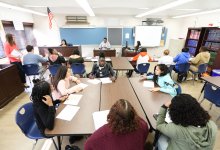Inquiry-Based Learning
Instead of just presenting the facts, use questions, problems, and scenarios to help students learn through their own agency and investigation.
Leveraging Student Interests to Teach Critical Analysis
Even when the topic isn’t a student’s favorite, teachers can encourage deep thinking through opportunities to make personal connections.207Your content has been saved!
Go to My Saved Content.Exploring Before Explaining Sparks Learning
New elementary science teachers can build student engagement and enhance learning by using the explore-before-explain approach.Your content has been saved!
Go to My Saved Content.Your Student Finished Early—Now What?
These extension activities for all grades will help teachers keep fast finishers engaged in meaningful work.Creating Authentic Learning Experiences in Early Childhood Classrooms
Bringing in outside experts and doing fieldwork can make project-based learning an invaluable experience for young learners.145Your content has been saved!
Go to My Saved Content.10 Studies Every Teacher Should Know About
How to integrate the science of reading, plan for effective review sessions with your students, think about inquiry-based learning, and more.What the Heck Is Inquiry-Based Learning?
Teachers use inquiry-based learning to combat the “dunno” -- a chronic problem in student engagement. Check out these four steps for creating inquiry-based curriculum.29.8kYour content has been saved!
Go to My Saved Content.7 Projects Teachers Stand By
Planning for projects can be difficult and time-consuming. This list of teacher-tested projects—complete with printable resources—should offer a big head start.Launching a PBL Unit With Preschool Students
Take advantage of young students’ natural curiosity through project-based learning that invites them to generate questions they care about.313Your content has been saved!
Go to My Saved Content.Encouraging Students’ Curiosity With Animal Observations
Observing animals provides an engaging way for students to build their critical thinking skills and curiosity.Inquiry-Based Tasks in Social Studies
Assignments that are bigger than a lesson and smaller than a unit are a good way to experiment with inquiry-based learning.10.6kYour content has been saved!
Go to My Saved Content.5 Axioms to Promote Deeper Discussions
Getting students engaged in sustained conversations requires a combination of inquiry, routine, and relationship building.An Instructional Approach That Boosts Student Confidence in Math
By combining direct instruction and an inquiry-based approach, teachers can improve accessibility and create more ‘aha!’ moments.Cultivating Curiosity in Kindergarten
Teachers can support students’ natural curiosity by creating a spot for them to post their questions, which can be the basis for future lessons.How to Use the 5E Model in Your Science Classroom
An inquiry-focused method gives students a way to connect scientific ideas to their experiences and apply their learning.3.9kYour content has been saved!
Go to My Saved Content.













